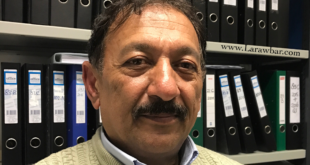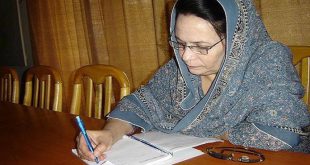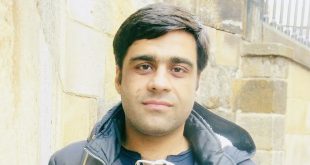Tappa, or Landey, is a Pashto poem which is a composition of two unequal meters, in which the first line consists of nine syllables and the second consists of thirteen syllables. It is the oldest and most popular genre of Pashto poetry. I think Tappa is the only genre of poetry in the world that is oldest in history, shortest in form, sweetest in melody, easiest in learn, appealing in singing and covering all subjects of life despite the fact that it has no particular poet or author. There are hundreds of thousands of Tappas in Pashto, yet no one can claim he has authored them. However, it is believed that Tappas are the voice of Pashtoon women and girls because most of the Tappas are related to their issues and are said by them. According to Rajwali Shah Khattak, a renowned Pashto scholar and former director of Pashto Academy, Peshawar, ‘Tappa is liked very much by the Pashtoons of all ages irrespective of their age and sex. Countless Tappas have been added by unknown poets and are sung with unsurpassed popularity’. Tappa’s popularity could be judged by the fact that every Pashtoon, whether they are a boy or a girl, a man or a woman, rich or poor, mullah or politician, educated or uneducated, shopkeeper or farmer, knows some Tappas. This short but concise poem covers every subject related to human life: lovers use them to express their feelings; boys declaim them to boast their bravery; women recite them in the occasions of happiness and sorrow; young girls sing them in wedding ceremonies; and politicians make their speeches impressive by decorating them with Tappas. And singers never like to miss a chance of singing Tappas with a melodious ‘Ya Qurban’. The legendary Pashtoon politician Khan Abdul Wali Khan had been very fond of reciting a lot of Tappas in his speeches. He had an enormous stock of Tappas in his mind which he used to tell skillfully describing current situations. This would make his speeches very impressive and inspiring. As a Pashtun, I am proud that we have such a rich literature and harmonious poetry. I have a non-Pashtoon friend who lives in Canada. He has studied the literature of many languages. When I told him about Tappa and translated some to him, he was deeply impressed. He asked me to send him a collection of Pashto Tappas with English translation but I could not because there were many Tappa collections but all were in Pashto and none had an English translation. However, for your aesthetic taste, I would like to write a few Tappas (with English translation by Rahmat Shah). گلونه ډېر دي خداى دې ډېر کړي The garden is full of flowers but I have to present the flower of patience to my lover. د پير بابا لاره ده سخته The journey to the Shrine of the Saint, the Peer Baba, is harsh and difficult. But I have to do it for you, O beautiful girl, the branch of flowers. ځان دې زړو جامو کې زوړ کړو You, the beautiful girl, dressed yourself in old and tattered clothes; you look like a garden of flowers showing through the ruins of a village. که د ځلمو نه پوره نه شوه If the young lads of the land failed to achieve the goals Bacha Khan, the pride of the Afghan nation; then it will be the lasses to file in for the achievement of his dreams and mission. چې د اياز په مخ شېدا شو Mehmood Ghaznavi uplifted the one time slave lover Ayaz to such a high position, that the king sought his advice in the matters of the state as if the slave was the ruler and the ruler was the slave. It is said that the famous Battle of Maiwand, Afghanistan, against Britons was won after a Pashtoon girl, Malaley, cried with this Tappa: که په مېوند کې شهيد نه شوې Young love if you do not fall in the battle of Maiwind;

د صبر گل به خپل اشنا له ورکومه
د گلو لختې زه به ستا لپاره ځمه
لکه په وران کلي کې باغ د گلو وينه
فخر افغانه جينکۍ به دې گټينه
محمود باچا د غلامانو غلام شونه
گرانه لاليه بې ننگۍ ته دې ساتينه
By God someone is saving you as a token of shame.
 لراوبر ویب پاڼه لراوبر يو افغان – تازه خبرونه
لراوبر ویب پاڼه لراوبر يو افغان – تازه خبرونه



